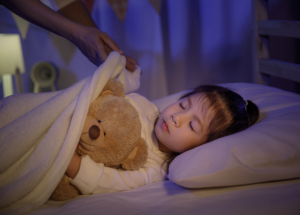Healthy Sleep Habits in Children

Sleep is a critical part of a child’s physical, mental and emotional well-being. It also plays a key role in academic outcomes and behavior. But Harbin Clinic pediatricians know that getting children to bed is not always easy. It is no wonder caregivers and parents have questions about the sleep aid, melatonin. Harbin Clinic pediatricians want to empower parents with a clear understanding of what melatonin is and how to use it safely.
What is melatonin?
Melatonin is a hormone-like substance that the brain produces naturally as part of the circadian rhythm. Typically, it is released at night and signals the body it’s time to sleep.

However, synthetic melatonin is also available over the counter in medicinal forms like a vitamin or dietary supplement. Because consumers can buy melatonin without a prescription, its specific use is not regulated by the Food and Drug Administration.
What does this mean for children?
Although the over-the-counter availability of melatonin allows for easy access, it is not a sleeping pill. Families should only use melatonin after a discussion with a pediatrician about healthy sleep habits.
Melatonin dosing can be very confusing due to the number of different forms the medicine can take. It comes in liquids, gummies, chewables, capsules and tablets, and each form has a different dose depending on the amount of melatonin.
Once a family talks with a pediatrician and decides a specific dose of melatonin is right for a child, Harbin Clinic pediatricians encourage parents to monitor dosing and store melatonin forms that look like candy in a safe place. In the spring of 2024, the Centers for Disease Control reported that over 11,000 small children had been to the emergency room for over ingesting melatonin when unsupervised.
Get back to sleep
Harbin Clinic pediatricians know families need good rest and want to help solve sleep problems. If your family is consistently practicing good bedtime habits and is still struggling, call and make an appointment today. Good bedtime habits include:
- Setting a consistent, early bedtime.
- Practicing calming bedtime activities such as using low lights, bathing or reading.
- Avoiding screens (tablets, televisions, computers and smartphones) at least one hour before bed.
If a family is especially concerned about a child’s natural melatonin levels, avoiding screens may be one of the most important practices. The blue light emitted by screens and the media content displayed can significantly reduce a child’s natural melatonin production, affecting them at a rate higher than adults.
To find a pediatrician that’s right for your family or to schedule an appointment, visit Harbin Clinic Pediatrics.


